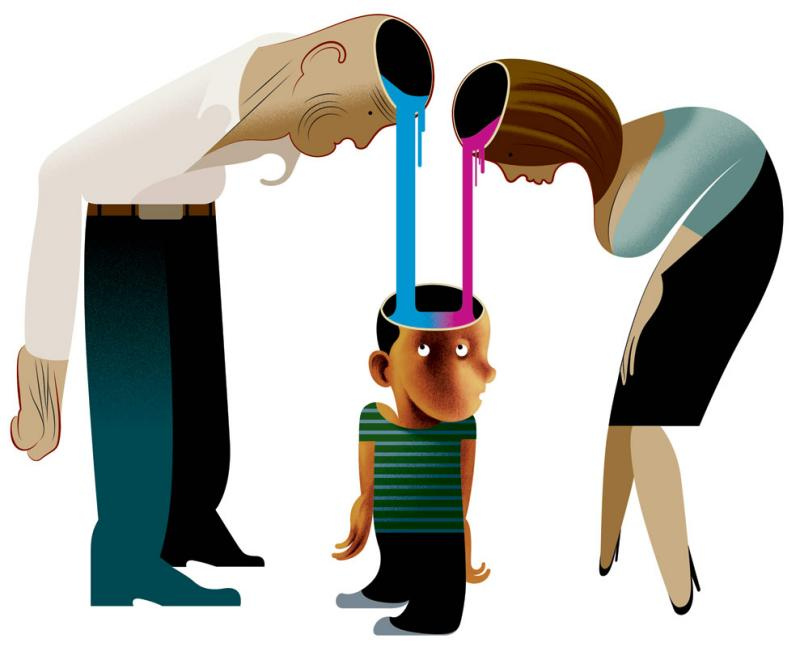Children sometimes lead us into despair. We think: “What irresponsible, soulless they are, they would only play and have fun!” We are nervous, angry, scolding them endlessly. Once we understand that this is a vicious circle: we are moving away from them more and more, they are becoming isolated from us, we cannot influence them.
If we move into an abusive style of education, we generally behave like strangers uncles and aunts who are disgusted that strangers behave ugly next to them.
Once I realized that the whole point was to change my view of education. Just look differently - and this will change quite a lot.
You need to look at your communication with children not as a burden and care, but as ... a puzzle, a puzzle - really puzzling. And keep in mind that this puzzle may not give in for years. But instead of “Oh horror!” you might think: “Well, let's fight with her!” (Only not with a task, but not with children).
After all, if a task is encountered in our profession, we do not get nervous, but solve it. And at the same time (if your work is your favorite) we take it with ardor and inspiration, and no difficulties stop us.
All kinds of tasks surround us. Work, everyday life supply us with whole mountains of tasks and tasks. But we must remember that for thousands of years man has survived among the most difficult conditions and catastrophes - which means that every person has extraordinary power to overcome difficulties. So are we really going to be nervous because the child is spreading porridge on the table? ..
I look at my work tasks, make plans. This and this I need to thoroughly study, to master it, to do this by such a date. I see that some of the working issues are complicated for me, and I am considering that it will take me several months or even years to resolve them. And I divide this tremendous question into parts and deal with one of the parts (even particles) every day.
Shouldn't we do the same for our children?
Children are our puzzle. Children are a terribly difficult and entertaining puzzle. What is in their heads? Why do they suddenly begin to be rude, leave trash behind, wipe with a towel smeared with paint? .. We are horrified by the number of these "why", we are drowning in them.
We take up one of these tasks and look at it as an entertaining and challenging one.
Of course, this task often differs from the tasks that our profession brings to us. Children not only ask us intractable questions, but also cause our emotions - not always positive (irritation, anger, pain, despair). And it is emotions that often prevent us from looking at the situation with children as a task. We get angry and stop controlling our behavior. We grumble, scream, scold them. And this does not solve the problem at all. We replace the true decision with an instant reaction - to make a comment, scold, shame. We reacted (as if we had fulfilled our parental duty towards children), but did not advance at all in the decision.
Looking at the conflict situation with children as a task allows us not to give in to emotions and respond more intelligently. We do not catch fire with anger or resentment - it passes us by. We are in a more balanced state of thinking - how to adequately respond now and how you can influence such situations later.
We constantly exchange emotions with children: we feel their condition and pass on our response feelings. We read unwanted behavior (rudeness, caprice), and feelings (anger, resentment) arise in us. Training (that is, a conscious focus and constant exercises) allows you to learn to reduce negative feelings in yourself (we do not allow ourselves to “get infected” with them, put a “screen”) or express them correctly.
We often don’t think that education needs to be studied, like any other business. And learning is effectively done in practice, not in conversation.
Look at conflicts not as a stressful situation, but as a communication training. And in order to learn how to effectively influence our children in a good way, we have to go through many such trainings.
Parenting sometimes causes despair because we consider ourselves to have been educators and that is why we are especially keen on our powerlessness and failure.
We are not educators yet. We are studying. We are trying. We were given incredibly many fascinating tasks. We have a lot of strength. We take on these tasks with gaiety and inspiration.
We must maintain in ourselves this good excitement that happens when solving a puzzle - lightness, cheerfulness, audacity, perseverance. And then communication with our children will turn into joy and fascinating research.
Author: Daria Velizhanina










